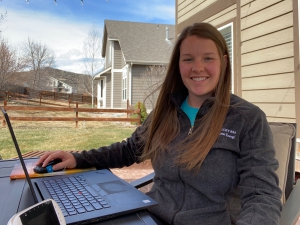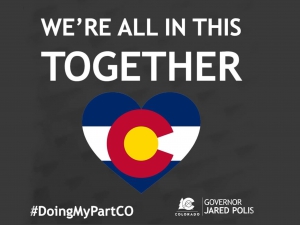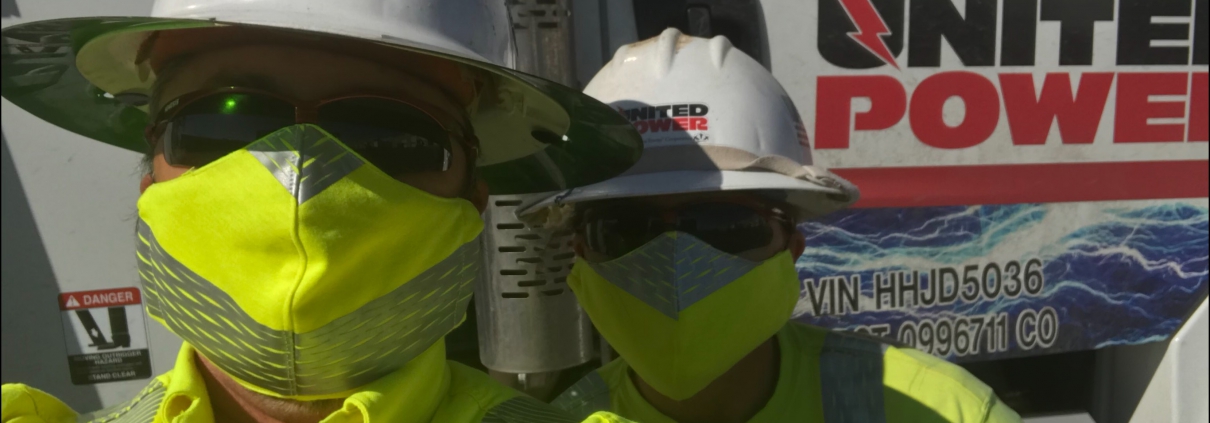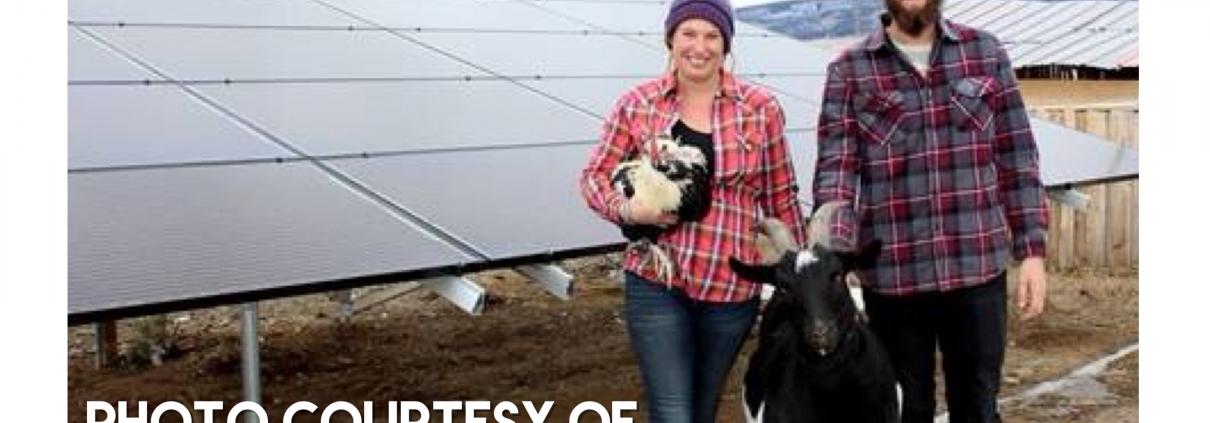By Amy Higgins
In the wake of COVID-19, Colorado’s electric cooperatives have quickly altered the way they deliver their essential services. It’s no doubt more challenging, but they are still continually looking for ways to help their communities. After all, “concern for community” is one of the seven cooperative principles each co-op passionately stands by.
Tending to the welfare of their families, friends, communities and worldwide population, Colorado’s electric cooperatives are adhering to their own safety guidelines as well as those provided by the Colorado Rural Electric Association, the local and national government and the World Health Organization and Centers for Disease Control and Prevention. While some co-ops weren’t initially equipped to do so, they swiftly figured out how to perform their work duties remotely and are using emails, phone calls and video chats to meet with fellow employees. Line crews are maintaining safe distances when on the job, and those few who still operate at co-op offices are performing maximum sanitization practices and distancing from others to make certain they’re available to consumer-members without the need of face-to-face interaction.
Over the last several weeks of uncertainty, Coloradans had to learn the ropes of “social distancing,” which can be contradictory to how they typically operate, including those electric co-op personnel still working in the field. “The rule [in our communities] is everything is about shaking hands, so it’s a little bit of a change from what they’re used to,” said Dale Kishbaugh, director of safety and loss control at CREA, adding, “Some of the members may look at it as guys being rude for not wanting to shake their hands, but the situation that we’re in, you’ve got to realize, it’s the best thing for them.”
The biggest challenge, Kishbaugh said, has been communication. “Our [line crews] are really, really good at hands-on. And having to convert over and try and put it into words in an email is a lot more challenging than we ever envisioned it would be,” he explained.
Since social distancing and sanitation standards were established, line crews have been relying on emails and phone calls to relay information instead of the face-to-face meetings they were accustomed to pre-COVID. CREA’s safety and loss control department is creating weekly videos to encourage and assist the crews when they’re on the job, highlighting the importance of maintaining safety practices and staying physically and psychologically healthy, among many other things. Topics have included the importance of personal protective equipment (PPE), job briefings and stress management.
Kishbaugh stressed the importance of getting outside, talking through stressors with someone you can count on and keeping family life and work life separated as much as possible.
In-house employees have also experienced the growing pains of change. “Initially, simply closing our offices to any member access was a paradigm shift,” said Tadius Huser from the member services team at Highline Electric Association in Holyoke. “We have drop boxes and drive-through windows that still function, as well as staffed offices to take calls. Eventually we worked on providing options for employees to work from home, and our IT team has done an exceptional job reacting to this need as, until this pandemic, we didn’t have a work -from-home option.”
Poudre Valley Rural Electric Association in Fort Collins recently held its first ever virtual annual meeting, with nearly 700 consumer-members tuning in — a considerable drop in comparison to the 1,800 average, but notable given today’s circumstances. “We certainly wish we were able to do this annual meeting in person like we’ve done for over 80 years. However, with the times we find ourselves in, that just isn’t possible,” said PVREA President and CEO Jeff Wadsworth in his opening remarks. “We look forward to next year when we’re able to meet in person.”
Andy Carter, member engagement manager at Cortez-based Empire Electric Association, said it was initially a challenge to get a work-at-home system in place with an IT department of two people and many staff members who never work from home. He explained: “We are a small co-op (60 employees) and, while we cross train employees, we don’t have a lot of depth to cover all of the normal duties if employees become ill.”
But the message has remained the same throughout Colorado’s electric co-op territories: “Our crews may be staggered and some of our employees may be working at home, but none of these changes impact the reliability of our services,” said Sarah Schaefer, communications supervisor and public information officer at Mountain View Electric Association, with offices in Falcon, Limon and Monument.
CO-OPS COLLABORATE
“Cooperation among cooperatives,” another cooperative principle, is significant for information sharing, brainstorming and assisting in a slew of ways, especially when the answers aren’t particularly evident.
“I am in regular communications with several other comparable cooperatives in Colorado. We are sharing ideas and resources, and brainstorming solutions. It’s a very collaborative and supporting environment,” said Hillary Knox, vice president of communications at La Plata Electric Association in Durango, adding, “no one has ever dealt with anything like this before.”

Amy Blunck, communications director at Poudre Valley Rural Electric Association, works at home during the mandatory statewide stay-at-home order issued by Gov. Polis.
Colorado’s electric cooperatives utilize the “cooperation among cooperatives” principle in a variety of ways, and always have. Utilities collaborate with local co-ops, CREA and the National Rural Electric Cooperative Association to help with communications efforts, both internally and externally; assist in a variety of local disaster relief efforts; dispatch assistance; share resources; and much more. “The beauty of ‘cooperation among cooperatives’ and working together is that we’re stronger and better for it,” said Christmas Wharton, communications manager at Grand Valley Power in Grand Junction.
“There is a special camaraderie among electric co-ops — we’re not competitors, we’re family. We have been for over 80 years,” said Amy Blunck, communications director at PVREA.
MAKING AN IMPACT
To help with COVID-19 relief efforts, several organizations are making financial contributions, including CREA, Tri-State Generation and Transmission Association and CoBank, a cooperative bank that serves agribusinesses, rural infrastructure providers and Farm Credit associations throughout the United States. CoBank recently announced that it is committing $1.4 million, Tri-State donated $200,000 and CREA contributed $5,000 toward those efforts.
Colorado’s electric cooperatives are also contributing to COVID-19 relief efforts. For example, Mountain Parks Electric made a generous donation to Mountain Family Center — both based in Granby — to help vulnerable populations faced with hardship in Grand and Jackson counties pay their electric bills during the COVID-19 outbreak.
GVP recognizes the hardships its community is incurring in the wake of the coronavirus outbreak, including small businesses. GVP is hosting several contests on Facebook that will give purchased gift certificates from local restaurants, service providers and boutiques to winners. The electric co-op also hosted a virtual food drive, and several of its employees took it upon themselves to sew face masks for local health care providers. “Our employees, even if it’s just time or energy, all contribute to our communities in the most wonderful ways,” Wharton said. “It’s because we’re a part of our community, and a rising tide lifts all boats.”
TOGETHER WE’RE STRONGER
It seems most folks recognize the gravity of the coronavirus pandemic, yet others underestimate the importance of social distancing and the toll it takes on all those surrounding them when they fail to do so. “That’s why they had to go to the extent of closing everything down — it’s because people weren’t following directions,” Kishbaugh stressed. “That’s why the restaurants are in the situation they’re in now — people kept congregating at the restaurants and [other places].”
 COVID-19 has had a detrimental effect on lives, livelihoods and the economy worldwide, and experts don’t envision a sudden “return to normalcy,” but following the guidelines presented by our health experts and legislators can help us get on the road to recovery.
COVID-19 has had a detrimental effect on lives, livelihoods and the economy worldwide, and experts don’t envision a sudden “return to normalcy,” but following the guidelines presented by our health experts and legislators can help us get on the road to recovery.
Right now, many are out of work and unable to afford provisions or pay their bills. However, if you take a look around, acts of kindness are being performed all around us, and companies, like your electric co-op, are urging consumer-members to contact them if they are struggling to pay their bills.
“I would like to acknowledge the stress and emotional toll it takes on the customer service reps working the phones making payment arrangements with our members who are scared and not sure how they will pay their bills. It’s a lot to do all day when they themselves are struggling with some of the same issues,” said Kathy Bertrand, member services manager at Yampa Valley Electric Association, based in Steamboat Springs and Craig.
Bottom line is, we’re in this together. “We urge our members to take the COVID-19 pandemic seriously and avoid all nonessential travel,” Blunck said. “Take this opportunity to enjoy the great outdoors in our beautiful state and spend more quality time with family. Our nation is strong, and we will get through this together.”
Amy Higgins has been writing for Colorado Country Life for nearly a decade and has a good understanding about the topics that affect its readership.




 COVID-19 has had a detrimental effect on lives, livelihoods and the economy worldwide, and experts don’t envision a sudden “return to normalcy,” but following the guidelines presented by our health experts and legislators can help us get on the road to recovery.
COVID-19 has had a detrimental effect on lives, livelihoods and the economy worldwide, and experts don’t envision a sudden “return to normalcy,” but following the guidelines presented by our health experts and legislators can help us get on the road to recovery.





